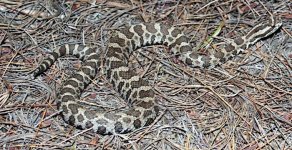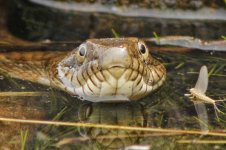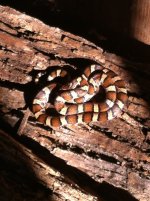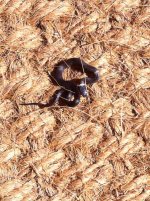The day I got bitten by a rattlesnake.

As I spent a few weeks every year kayaking in Massasauga rattlesnake country, I'm quite familiar with their insect-like high pitched rattle.
It's a medium volume "zzzzzzzt" unlike the rattlesnakes heard when growing up in the prairies.
My usual kayak tripping partner, Doug Harvey, and I were camping in Georgian Bay's Bustard Islands.
It had been raining for most of this two-week long trip and was a bit cold.
Thinking that terrestrial snakes would be safely back in the scrub keeping dry,
I was not as careful as I usually am when hiking in rattlesnake country.
Rather, I spent too much attention looking down at water's edge trying to find water snakes. Big mistake!
Suddenly, I felt a finger-like flick on my foot about ankle level. I jumped back and, as I looked down,
a rather young and very pretty little Massasauga rattler started to rattle.
I was fiddling with my camera trying to get that perfect photo when it dawned on me,
did I just get bitten by a rattlesnake?!
I walked slowly back to camp and asked Doug to take a close look for a couple of small pin-pricks
about 1/4 to 1/2 inch apart parallel to the ground, maybe a little tiny drop of blood, maybe not.
He said that, as he didn't have his bifocals on, he really couldn't tell anything different from mosquito bites.
The Bustards have cell phone coverage (go figure), so I phoned my daughter Michelle
and asked her to Google Massasauga rattlesnake to get the low-down on bite symptoms.
The information she provided was invaluable.
(And yes, I should have been carrying the info with me.)
Had we been near or able to get to a medical facility quickly, we would have gone straight there.
However, a rescue for me would have been either by speed-boat or helicopter so,
as I was wearing heavy wool socks with longjohns, tight-weave pants and rain pants and
since about 1/3 of Massasauga rattler bites are dry, I decided to take a wait and see approach.
In retrospect, this was a very dumb move. I was very lucky and should have contacted 911.
Had this been an envenomated bite, I could have been in deep trouble.
While waiting and keeping a close eye on the possible bite area,
Doug and I worked on evacuation plans and getting our kayaks and gear back to the put-in.
About a 1/2 hour later, my heart finally started to calm down. As nothing seemed untowards,
I called this as a tag rather than a bite.
I waited a full 2 hours before breaking out the black rum.
A little pour on the ground to thank the powers that be
and a big pour for me so I could salute and apologize to my cute little friend for scaring her.

As I spent a few weeks every year kayaking in Massasauga rattlesnake country, I'm quite familiar with their insect-like high pitched rattle.
It's a medium volume "zzzzzzzt" unlike the rattlesnakes heard when growing up in the prairies.
My usual kayak tripping partner, Doug Harvey, and I were camping in Georgian Bay's Bustard Islands.
It had been raining for most of this two-week long trip and was a bit cold.
Thinking that terrestrial snakes would be safely back in the scrub keeping dry,
I was not as careful as I usually am when hiking in rattlesnake country.
Rather, I spent too much attention looking down at water's edge trying to find water snakes. Big mistake!
Suddenly, I felt a finger-like flick on my foot about ankle level. I jumped back and, as I looked down,
a rather young and very pretty little Massasauga rattler started to rattle.
I was fiddling with my camera trying to get that perfect photo when it dawned on me,
did I just get bitten by a rattlesnake?!
I walked slowly back to camp and asked Doug to take a close look for a couple of small pin-pricks
about 1/4 to 1/2 inch apart parallel to the ground, maybe a little tiny drop of blood, maybe not.
He said that, as he didn't have his bifocals on, he really couldn't tell anything different from mosquito bites.
The Bustards have cell phone coverage (go figure), so I phoned my daughter Michelle
and asked her to Google Massasauga rattlesnake to get the low-down on bite symptoms.
The information she provided was invaluable.
(And yes, I should have been carrying the info with me.)
Had we been near or able to get to a medical facility quickly, we would have gone straight there.
However, a rescue for me would have been either by speed-boat or helicopter so,
as I was wearing heavy wool socks with longjohns, tight-weave pants and rain pants and
since about 1/3 of Massasauga rattler bites are dry, I decided to take a wait and see approach.
In retrospect, this was a very dumb move. I was very lucky and should have contacted 911.
Had this been an envenomated bite, I could have been in deep trouble.
While waiting and keeping a close eye on the possible bite area,
Doug and I worked on evacuation plans and getting our kayaks and gear back to the put-in.
About a 1/2 hour later, my heart finally started to calm down. As nothing seemed untowards,
I called this as a tag rather than a bite.
I waited a full 2 hours before breaking out the black rum.
A little pour on the ground to thank the powers that be
and a big pour for me so I could salute and apologize to my cute little friend for scaring her.




